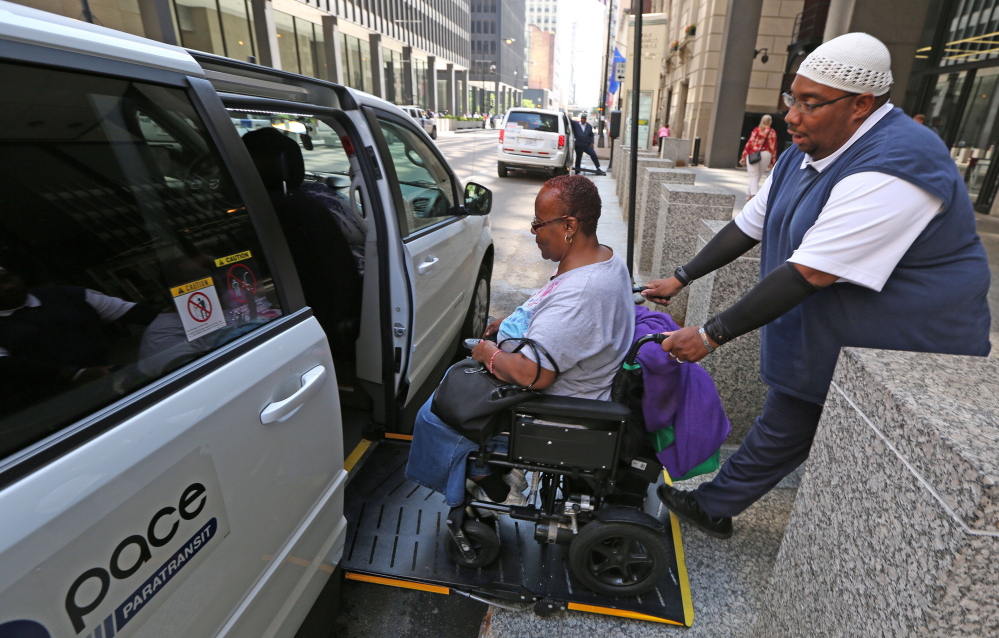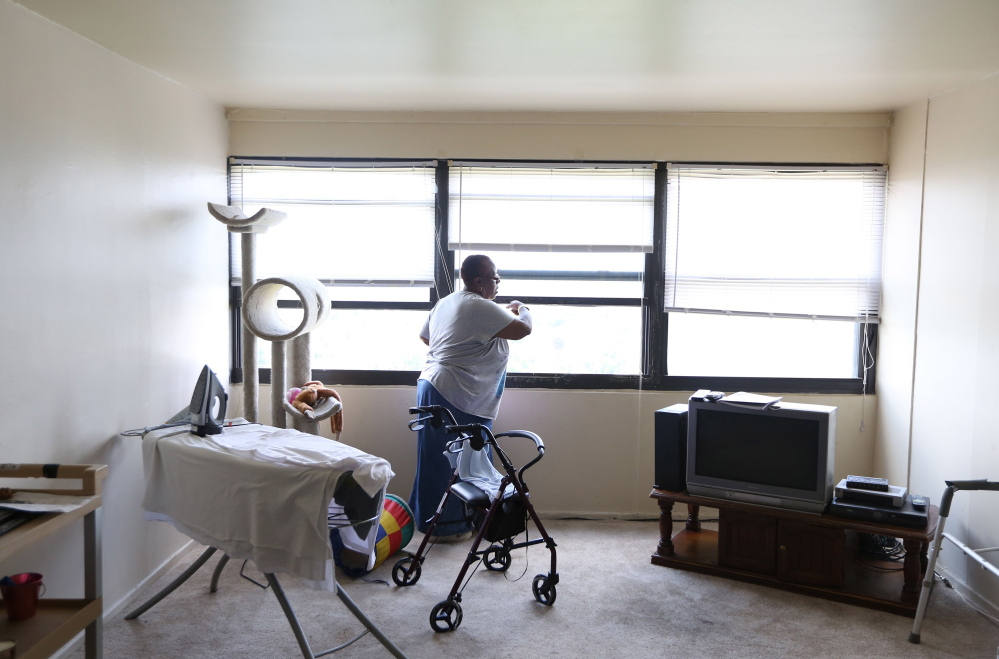CHICAGO — Life can change in a second. Marca Bristo knows that.
Her second happened in 1977. The then-23-year-old world traveler and career woman inhaled deeply as she watched the waves on Lake Michigan. Next, she dove headfirst into the blue water and – suddenly – into life with a disability.
“Zap,” said Bristo, now 62. The plunge broke her neck and paralyzed her from the chest down.
“I lost my home, my health insurance, my means of getting around the city,” she said. “One day I was one way, and the next day I was different.”
Different meant living life seated. But it also meant realizing her wheelchair did not limit her – the city around her did.
“A wheelchair is a liberation device,” Bristo said, but “1977 Chicago was sort of like a Third World country.”
It was before the Americans with Disabilities Act, which was signed into law 25 years ago last Sunday. It was a time when buses didn’t kneel for wheelchairs and curbs weren’t cut into ramps. That grocery store a block and a half from her house? Impossible to get to. And if she wanted to go out for dinner, front steps were impassable mountains, and front doors were rarely wide enough.
If she was lucky, a waiter wheeled her through the service entrance.
“I saw all too many of my shares of kitchens,” she said.
But the federal act changed that, said Bristo, now president and CEO of Chicago’s Access Living, an organization that engages the city’s disabled community. She also helps lead ADA 25 Chicago, a citywide initiative to celebrate the anniversary and use the milestone to look for ways to move forward.
“We just had Independence Day, July 4. But July 26 is our Independence Day,” she said. “It was a moment where we ourselves felt strong. It was just jubilation. Nothing short of that. Aside from being a legal victory, it also represented a huge philosophic shift.”
Over the course of 25 years, Chicago has crescendoed into a city that the disabled can navigate. Whether physically disabled, blind, deaf, unable to speak or mentally disabled, a grocery store trip or run to the bank isn’t out of the question. Neither is visiting family or friends, commuting to work or attending a Cubs or White Sox game.
Every fixed-route Pace and CTA bus is now accessible to disabled people, said Susan Massel, spokeswoman for the Regional Transportation Authority. One hundred “L” stations are accessible too, and both trains and buses – and more than 330 bus shelters – have automated audio and visual route identification and stop announcements. Massel also said Metra’s 200 busiest stations are accessible, as are all the train cars.
“I think it’s wonderful,” said Terri Michaels, 57. Because of the act, her 22-year-old intellectually disabled daughter, Annie Michaels, can maneuver the city with ease. She works three jobs – at Mariano’s, T.J. Maxx and Kids First Pediatrics – and takes public transportation to all of them.
“I’m very capable of getting out and about,” Annie Michaels said. Her mom said it makes her more independent, and Annie Michaels agreed.
“I’ll be living on my own soon,” she said.
Though fixed-route transportation is free based on income for some disabled people, Massel said $3 prearranged shuttles rides can pick them up and deliver them to exact locations. That’s how Renita Freeman, 62, gets to her doctor’s appointments.
Freeman lived most of her life on her feet, but around the age of 50, after carpal tunnel syndrome, a diabetes diagnosis and osteoporosis, “my body just broke down.” She avoided the inevitable as long as she could.
“I let the wheelchair sit in my house for like three years, four years,” she said. Instead, she used a cane. Then a walker. But she was slow-moving, and her bones ached. “I was terrified. You worry about the people, what they’re going to say.”
But one day she sat down anyway. And rolled forward.
“When I got the hang of it, I went everywhere,” Freeman said in her apartment, just east of Jackson Park. “I’m not a stay-in-the-house kind of girl. I like to get out, smell the roses.”
She does. She explores her block, her neighborhood. She boards buses to work, where she helps teach young children at Holman Leadership Academy. She visits friends. One of them hosted her birthday party – she turned 63 Saturday.
The transportation system “could use some more bells and whistles, but it gets us around,” she said. “Whoever thought of the disabilities act, I applaud that person.”
And then she did: Freeman smiled as she smacked her hands together.
While many celebrated the ADA anniversary, the Chicago initiative acknowledges its shortfalls in all areas, said Karen Tamley, commissioner of the Mayor’s Office for People with Disabilities. About 160 small businesses, nonprofits and agencies have partnered to create solutions.
Some ideas? Expanding the number of accessible taxicabs, fitness centers and playgrounds, she said. Tamley also hoped for more competitive career opportunities, better educational resources, more accommodating technology and more acceptance of the disabled from the Chicago community.
“It’s the only minority group people can enter at any time of their life through accident or illness,” said Tamley, who has been disabled since birth. The solutions are “something that anybody can benefit from.”
She pointed out how many parents use the 80,000 cut curbs in the city to easily push their strollers through intersections, or how many people slide into CTA station elevators when the stairs are packed from a freshly unloaded train.
“I grew up before the ADA was a reality,” Tamley said. “When I was a kid I wasn’t able to get on a bus. I was carried into restaurants and onto playgrounds. Just to fast-forward and see the changes even in my own lifetime has been significant. But yet we still really do have a long way to go.”
The gap in disabled employment rates has not budged much since the act passed. Disability-friendly design is still an afterthought, not a planned priority, she said – both in the classroom and on building blueprints.
“The promise of the ADA is not yet complete,” she said. “There’s still a lot of work to be done.”
Copy the Story LinkSend questions/comments to the editors.




Success. Please wait for the page to reload. If the page does not reload within 5 seconds, please refresh the page.
Enter your email and password to access comments.
Hi, to comment on stories you must . This profile is in addition to your subscription and website login.
Already have a commenting profile? .
Invalid username/password.
Please check your email to confirm and complete your registration.
Only subscribers are eligible to post comments. Please subscribe or login first for digital access. Here’s why.
Use the form below to reset your password. When you've submitted your account email, we will send an email with a reset code.